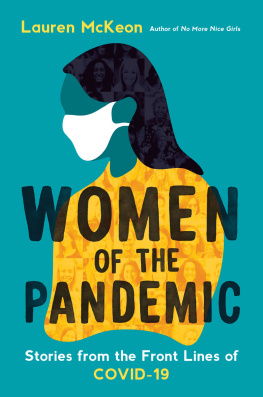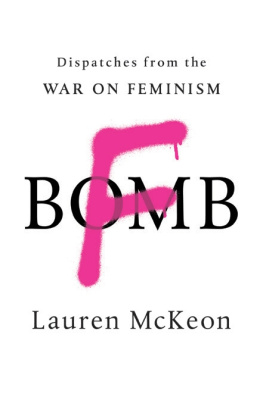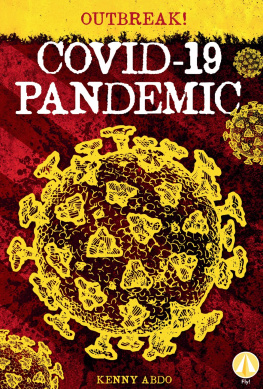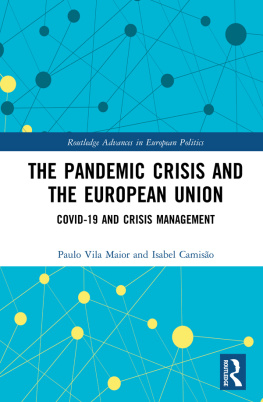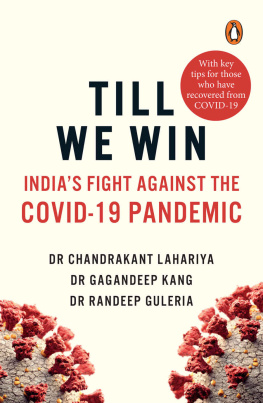Lauren McKeon - Women of the Pandemic: Stories from the Frontlines of COVID-19
Here you can read online Lauren McKeon - Women of the Pandemic: Stories from the Frontlines of COVID-19 full text of the book (entire story) in english for free. Download pdf and epub, get meaning, cover and reviews about this ebook. year: 2021, publisher: McClelland & Stewart, genre: Art. Description of the work, (preface) as well as reviews are available. Best literature library LitArk.com created for fans of good reading and offers a wide selection of genres:
Romance novel
Science fiction
Adventure
Detective
Science
History
Home and family
Prose
Art
Politics
Computer
Non-fiction
Religion
Business
Children
Humor
Choose a favorite category and find really read worthwhile books. Enjoy immersion in the world of imagination, feel the emotions of the characters or learn something new for yourself, make an fascinating discovery.
- Book:Women of the Pandemic: Stories from the Frontlines of COVID-19
- Author:
- Publisher:McClelland & Stewart
- Genre:
- Year:2021
- Rating:4 / 5
- Favourites:Add to favourites
- Your mark:
- 80
- 1
- 2
- 3
- 4
- 5
Women of the Pandemic: Stories from the Frontlines of COVID-19: summary, description and annotation
We offer to read an annotation, description, summary or preface (depends on what the author of the book "Women of the Pandemic: Stories from the Frontlines of COVID-19" wrote himself). If you haven't found the necessary information about the book — write in the comments, we will try to find it.
Lauren McKeon: author's other books
Who wrote Women of the Pandemic: Stories from the Frontlines of COVID-19? Find out the surname, the name of the author of the book and a list of all author's works by series.
Women of the Pandemic: Stories from the Frontlines of COVID-19 — read online for free the complete book (whole text) full work
Below is the text of the book, divided by pages. System saving the place of the last page read, allows you to conveniently read the book "Women of the Pandemic: Stories from the Frontlines of COVID-19" online for free, without having to search again every time where you left off. Put a bookmark, and you can go to the page where you finished reading at any time.
Font size:
Interval:
Bookmark:
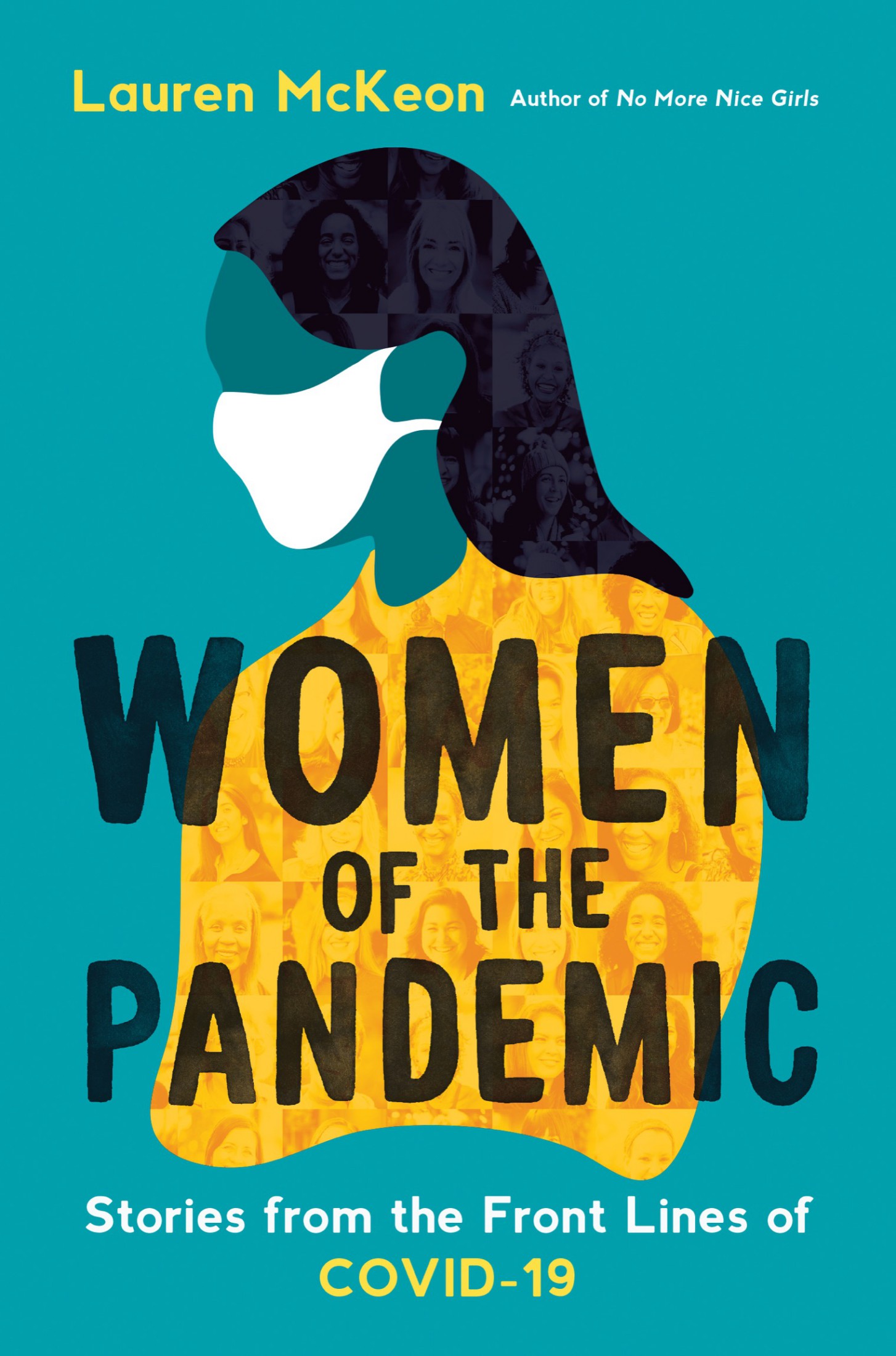
ALSO BY LAUREN McKEON
No More Nice Girls
F-Bomb
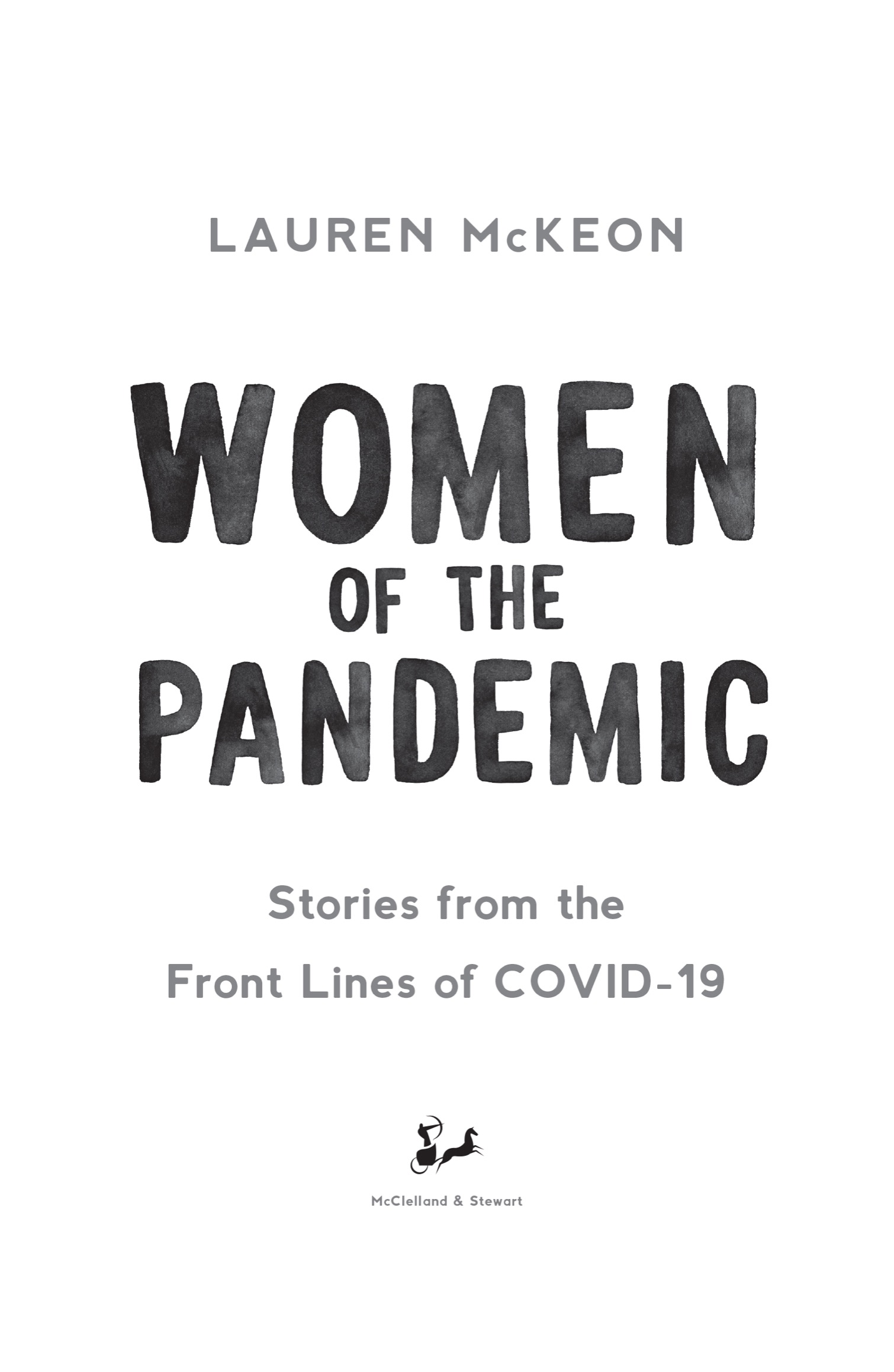
Copyright 2021 by Lauren McKeon
First edition published 2021
McClelland & Stewart and colophon are registered trademarks of Penguin Random House Canada Limited.
All rights reserved. The use of any part of this publication reproduced, transmitted in any form or by any means, electronic, mechanical, photocopying, recording, or otherwise, or stored in a retrieval system, without the prior written consent of the publisheror, in case of photocopying or other reprographic copying, a licence from the Canadian Copyright Licensing Agencyis an infringement of the copyright law.
Library and Archives Canada Cataloguing in Publication data is available upon request.
ISBN:9780771050398
Ebook ISBN:9780771050480
Cover and book design by Andrew Roberts
Cover images: (faces) adamkaz / Getty Images; (woman) Olga Maloushkina / Shutterstock Images; (lettering) Julia August / Shutterstock Images
McClelland & Stewart,
a division of Penguin Random House Canada Limited,
a Penguin Random House Company
www.penguinrandomhouse.ca

a_prh_5.6.1_c0_r0
To all the women on the front linethank you.
In early December 2019, the Huanan Seafood Wholesale Market in Wuhan was bustling. Customers wove their way through the narrowly spaced stalls, shrewdly eyeing coils of octopus, slabs of fat-laced meat, pyramids of fresh greens. Its possible they bought a freshly slaughtered animal: tuna, deer, hedgehog, something else. In certain areas, their shoes likely sloshed through the water vendors use to constantly hose down produce, fish, and other perishable goods, giving the nickname wet market to such places in China and other countries across Asia. Maybe their fingertips brushed a strangers hand as they browsed, or when they paid, or through any other simple accident. Or perhaps none of that happened before they went home to families, groceries in hand, ready to cook dinner, ready to relax. Months later, science was still unable to definitively explain what separated the first unlucky grouptwenty-seven market vendors, employees, and customersfrom everyone else in Wuhan, including at least a dozen others who suddenly arrived in the citys hospitals that month with mysterious pneumonia-like symptoms.
It didnt take long for doctors and researchers in China to realize the puzzling virus was new, highly contagious, and deadly. The Wuhan Municipal Health Commission announced the potential SARS-like illness to media in late December. In less than a week, the number of cases climbed from forty-one to fifty-nine. Then, on January 11, a sixty-one-year-old man who was a regular customer at the market died. He had been admitted to the hospital after a seven-day fever, persistent cough, and difficulty breathing. Five days after he became sick, his fifty-three-year-old wife, whod never been to the market, was also admitted. Still, at the time, few fully grasped the wildfire nature of the yet-unnamed novel coronavirus. By January 19, both the Chinese government and the World Health Organization (WHO) had estimated the virus had only limited potential for human-to-human transmission. Four days later, China abruptly closed Wuhans borders, shutting off transportation both to/from and within the city. Seventeen people had died, and at least another 570 were sick.
A week after that, the WHO declared a global health emergency. If [China] fails to control it, then we should also be grateful to them, because they have demonstrated that it cannot be controlled, Dr. Allison McGeer, an infectious disease specialist at Mount Sinai Hospital in Toronto, told media that same day. If these public health measures are not enough, then none of the rest of us will be able to do it either. People were worried the virus could be another SARS (Severe Acute Respiratory Syndrome), which has, to date, killed 800 people worldwide, or MERS (Middle East Respiratory Syndrome), which has not been eradicated and which had, by the end of 2019, killed over 850 people. McGeer, who had been on the front lines of the SARS fight, and who had herself contracted the virus, repeatedly assured media that, for now, for Canadians, the virus wasnt anything to worry about. There are things that should frighten you about this coronavirus, she added, but getting it in Toronto today is not one of them. Still, she cautioned, the modern world had never before watched the emergence of a new virus. Like other medical experts, she urged calm. In North America, the dominant refrain took shape: This virus would not be like SARS. It would not be like MERS. It would not be like the 1918 influenza pandemic. It was not the plague.
Those predictions, as it turned out, were half-right. COVID-19 was finally named on February 11, a simple abbreviation of coronavirus disease 2019. The day after, Chinas death toll surpassed 1,100, and more than 46,000 cases were confirmed. Outside of the epicentre, twenty-four countries were also reporting cases. Then, on Valentines Day, the virus killed an eighty-year-old tourist in Paris. Cases in South Korea surged, all linked back to one church and one woman. Then, Italy. Haunting images emerged of iconic, seemingly never-empty streets, now policed and abandoned; painfully sparse sick bays housed rows of masked, frail bodies; agonized doctors in robin-blue protective gear told of rationing vital equipment, choosing who would live and die. For healthcare workers in Canada, it became another signal that perhaps we would not escape whatever hell was emerging, after all. For many others outside the field, however, the story remained fuzzy, distanta ship looming on the horizon. That changed on March 11, 2020, when, roughly one hundred days after the first person presented with symptoms in Wuhan, the WHO named COVID-19 a global pandemic.
WHO has been assessing this outbreak around the clock and we are deeply concerned both by the alarming levels of spread and severity, and by the alarming levels of inaction, said the organizations director-general, Tedros Adhanom Ghebreyesus, at a media conference. At the time of his announcement, there were more than 118,000 cases in 114 countries, and nearly 4,300 people had died. We have never before seen a pandemic sparked by a coronavirus, he added. And we have never before seen a pandemic that can be controlled.
When I heard the news, I was in my office at Yonge and Bloor streets, one of the busiest intersections in Toronto, where I work as the deputy editor of Readers Digest Canada. I headed home that night on my usual sardine-tin subway car, stopping at a big box near my apartment for groceries. As I pondered yogourt flavours, another customer, a woman wearing a mask, marvelled at the lack of toilet paper, Lysol, pasta, canned anything. I dont know if she was talking to me, or to no one, but I smiled and said something inane like, Isnt it wild? We both seemed shell-shocked. I saw her again at the checkout, apologetically sanitizing the conveyer belt. Behind us, a couple had a cart piled high and clinking. The next morning, I looked out from my buildings window, onto another normally busy intersection, and for the first time in the two years Id lived there, saw no cars. It stayed apocalyptically calm for hours, days, weeks. At night, under a newly pinprick sky, Id watch busses rattle up and down the street, empty.
Font size:
Interval:
Bookmark:
Similar books «Women of the Pandemic: Stories from the Frontlines of COVID-19»
Look at similar books to Women of the Pandemic: Stories from the Frontlines of COVID-19. We have selected literature similar in name and meaning in the hope of providing readers with more options to find new, interesting, not yet read works.
Discussion, reviews of the book Women of the Pandemic: Stories from the Frontlines of COVID-19 and just readers' own opinions. Leave your comments, write what you think about the work, its meaning or the main characters. Specify what exactly you liked and what you didn't like, and why you think so.

